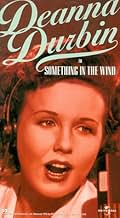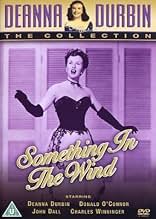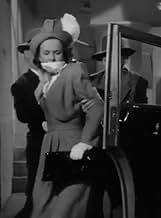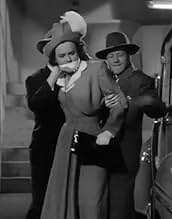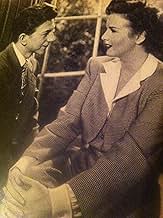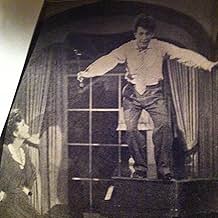IMDb RATING
6.5/10
556
YOUR RATING
A grandson of a recently deceased millionaire mistakes a beautiful female disc jockey for her aunt, who once dated the grandfather.A grandson of a recently deceased millionaire mistakes a beautiful female disc jockey for her aunt, who once dated the grandfather.A grandson of a recently deceased millionaire mistakes a beautiful female disc jockey for her aunt, who once dated the grandfather.
The Williams Brothers
- Singing Quartet
- (as The Four Williams Brothers)
Jacqueline deWit
- Fashion Show Saleslady
- (as Jacqueline de Wit)
Patricia Alphin
- Fashion Show Model
- (uncredited)
Polly Bailey
- Old Woman
- (uncredited)
William Bailey
- Mr. Belton's Assistant
- (uncredited)
Audrey Betz
- Women's Quartette Member
- (uncredited)
Stanley Blystone
- TV Station Guard
- (uncredited)
Betty Blythe
- Society Matron
- (uncredited)
June Bright
- Fashion Show Model
- (uncredited)
Ralph Brooks
- Radio Station Prompter
- (uncredited)
Featured reviews
I recently purchased this DVD as part of a six movie pack. I wished to review "Something In The Wind" because I had focused on Donald O'Connor too much. I was pleased to note that Deanna Durbin was an accomplished light comedy actress in addition to her vocal talents. The ease with which she performed her first song in this movie as a disc jockey is an excellent example of her innate acting ability.
The role played by John Dall seemed too far removed from his role in "The Corn Is Green". There seemed to be little chemistry between Durbin and Dall.
Donald O'Connor was polished as usual but then he had been in movies for over a decade by this time having debuted with Bing Crosby and Fred MacMurray in "Sing You Sinners". It was interesting to realize that the zany short routine he did for Deanna was the groundwork for his 'Make 'Em Laugh' routine in "Singing In The Rain".
Although the impact of "100 Men And A Girl" was never realized again, Deanna Durbin left an enjoyable body of work in her career in Hollywood. There were five or so as a young teen-ager beginning with "Three Smart Girls", "100 Men And A Girl", "Mad About You", "That Certain Age" and Three Smart Girls Grow Up".
With the advent of "First Love" (her'first screen kiss')and pairing with Bob Stack, she began to leave the adolescent stage. Her subsequent movies showed that she had acting ability in addition to her juvenile charm and appealing voice. She did not experience the awkward stage of Shirley Temple and graduated smoothly into adult roles. She may not have been another Irene Dunne nor Rosalind Russell but her comedy was enjoyable and her vocalization always pleasant albeit somewhat schmaltzy to some.
The Williams Bros received billing in this movie but it would be difficult to pick out which one was Andy.
For those not fortunate enough to have grown up in the Deanna Durbin 'saves Univeral Studio' era, this movie is one fine example of how she did it. Light but very entertaining.
The role played by John Dall seemed too far removed from his role in "The Corn Is Green". There seemed to be little chemistry between Durbin and Dall.
Donald O'Connor was polished as usual but then he had been in movies for over a decade by this time having debuted with Bing Crosby and Fred MacMurray in "Sing You Sinners". It was interesting to realize that the zany short routine he did for Deanna was the groundwork for his 'Make 'Em Laugh' routine in "Singing In The Rain".
Although the impact of "100 Men And A Girl" was never realized again, Deanna Durbin left an enjoyable body of work in her career in Hollywood. There were five or so as a young teen-ager beginning with "Three Smart Girls", "100 Men And A Girl", "Mad About You", "That Certain Age" and Three Smart Girls Grow Up".
With the advent of "First Love" (her'first screen kiss')and pairing with Bob Stack, she began to leave the adolescent stage. Her subsequent movies showed that she had acting ability in addition to her juvenile charm and appealing voice. She did not experience the awkward stage of Shirley Temple and graduated smoothly into adult roles. She may not have been another Irene Dunne nor Rosalind Russell but her comedy was enjoyable and her vocalization always pleasant albeit somewhat schmaltzy to some.
The Williams Bros received billing in this movie but it would be difficult to pick out which one was Andy.
For those not fortunate enough to have grown up in the Deanna Durbin 'saves Univeral Studio' era, this movie is one fine example of how she did it. Light but very entertaining.
7tavm
After seeing her Three Smart Girls on the same DVD, I watched the other of Deanna Durbin's movies on it-this one, Something in the Wind. Made more than a decade after the previous one I mentioned, Ms. Durbin is no longer a young teen here but quite an alluring adult. She sings both her familiar opera songs and some more contemporary music of the time to fine effect. One of her costars is Donald O'Connor, just out of the military and doing his funny enough shticks-some of which may be familiar to modern viewers if they've seen Singin' in the Rain. Another of Ms. Durbin's costars one may be familiar with here is Charles Winninger-who I just watched play her father in TSG-playing Donald's Uncle Chester. No, she doesn't end up with Donald but the leading man named John Dall. Don't really want to reveal the plot which isn't really all that believable, just turn your brain off and enjoy Something in the Wind.
When Mary Collins strides out utterly confident on stage to sing, I had a momentary flashback to Ethel Merman in 1959 striding down the theater aisle and calling, "Sing out, Louise, sing out!" Mary Collins, I mean Deanna Durbin at 26, was a supremely confident actress and singer, and there are a few times when you wouldn't want to get in her way. Balancing that are things Merman didn't have...a warm personality, a lovely face, a smile that could win you over and a voice that wouldn't break your eardrums. Merman was an amazing, one-of-a-kind performer; so was Deanna Durbin. What they share is a perfect confidence in their talent.
With Something in the Wind, audiences were watching a romantic comedy with songs featuring a mature young woman they'd been in love with since she was 15. Alone among the child stars of the Thirties, Deanna Durbin grew up on screen while maintaining her stardom, her poise and her box office clout. Here, as Mary Collins, she's a disc jockey who discovers that her aunt who raised her, also named Mary Collins, had been receiving regular checks from a wealthy industrialist. They had once been in love but the marriage plans had been broken up by his family. The whole thing was platonic, but when the old man died his will stated that the financial arrangements must continue. But now the young scion of the family, Donald Read (John Dall), wants to stop the arrangement and pay Mary Collins off. He wants no scandal. He thinks our Mary has been his grandfather's friend. He doesn't realize our Mary has an aunt with the same name. Mary doesn't know what he's talking about but is furious at the implication. Donald is a prig and engaged to a well-bred socialite. His grandmother is a woman who believes breeding is all. His younger brother, Charlie (Donald O'Connor), is much more unconventional. After our Mary is kidnapped and at first kept at the Read family mansion until she agrees to the arrangement, we are in for over an hour of romantic mix- ups, complicated machinations, a perfect lawyer (blind and deaf), six songs by Durbin, three songs and comedy routines by O'Connor, and then true love finding a way. What does the movie add up to? For firm Deanna Durbin fans, a delight. For those who simply like her a lot, a mixed bag.
On the plus side are Durbin and O'Connor. One almost wishes they'd been the happy couple at the end. Durbin sings everything from a bit of Verdi to a down-and-dirty "You want to keep your baby lookin' right, doncha, Daddy?" Her personality shines through. She's funny and sincere. O'Connor is O'Connor and he's great. He has one number, "I Love a Mystery," which is almost a rehearsal for his "Make 'Em Laugh" routine in Singin' in the Rain. The songs, by Johnny Green and Leo Robin, are just fine, with two better than just fine numbers, "The Turntable Song" and "Something in the Wind." And one unexpected and stylishly handled bit features a cameo by Jan Peerce, the great American tenor who had a long career at the Met, as a singing jailer. Durbin is in the jail. It's not long before before they're sharing a duet from Il Trovatore and arguing about who stepped on whose obbligato.
But the movie begins to get tedious when the Mary Collins mix-up is finally discovered, love between Mary and Donald emerges and serious complications concerning proper family breeding sets in. Most problematic is John Dall as Donald Read, the stuffy hero who learns to love. Dall always seemed to me to be not only a limited actor but a man who, just as Lawrence Harvey always seemed genuinely unlikeable, always seemed genuinely artificial. He was unnerving as the artificially sincere killer-for-thrills in Rope a year later, but here he creates a big hole in the movie. He simply isn't interesting enough or strong enough to compete in the comedy or romance departments with Durbin.
With Something in the Wind, audiences were watching a romantic comedy with songs featuring a mature young woman they'd been in love with since she was 15. Alone among the child stars of the Thirties, Deanna Durbin grew up on screen while maintaining her stardom, her poise and her box office clout. Here, as Mary Collins, she's a disc jockey who discovers that her aunt who raised her, also named Mary Collins, had been receiving regular checks from a wealthy industrialist. They had once been in love but the marriage plans had been broken up by his family. The whole thing was platonic, but when the old man died his will stated that the financial arrangements must continue. But now the young scion of the family, Donald Read (John Dall), wants to stop the arrangement and pay Mary Collins off. He wants no scandal. He thinks our Mary has been his grandfather's friend. He doesn't realize our Mary has an aunt with the same name. Mary doesn't know what he's talking about but is furious at the implication. Donald is a prig and engaged to a well-bred socialite. His grandmother is a woman who believes breeding is all. His younger brother, Charlie (Donald O'Connor), is much more unconventional. After our Mary is kidnapped and at first kept at the Read family mansion until she agrees to the arrangement, we are in for over an hour of romantic mix- ups, complicated machinations, a perfect lawyer (blind and deaf), six songs by Durbin, three songs and comedy routines by O'Connor, and then true love finding a way. What does the movie add up to? For firm Deanna Durbin fans, a delight. For those who simply like her a lot, a mixed bag.
On the plus side are Durbin and O'Connor. One almost wishes they'd been the happy couple at the end. Durbin sings everything from a bit of Verdi to a down-and-dirty "You want to keep your baby lookin' right, doncha, Daddy?" Her personality shines through. She's funny and sincere. O'Connor is O'Connor and he's great. He has one number, "I Love a Mystery," which is almost a rehearsal for his "Make 'Em Laugh" routine in Singin' in the Rain. The songs, by Johnny Green and Leo Robin, are just fine, with two better than just fine numbers, "The Turntable Song" and "Something in the Wind." And one unexpected and stylishly handled bit features a cameo by Jan Peerce, the great American tenor who had a long career at the Met, as a singing jailer. Durbin is in the jail. It's not long before before they're sharing a duet from Il Trovatore and arguing about who stepped on whose obbligato.
But the movie begins to get tedious when the Mary Collins mix-up is finally discovered, love between Mary and Donald emerges and serious complications concerning proper family breeding sets in. Most problematic is John Dall as Donald Read, the stuffy hero who learns to love. Dall always seemed to me to be not only a limited actor but a man who, just as Lawrence Harvey always seemed genuinely unlikeable, always seemed genuinely artificial. He was unnerving as the artificially sincere killer-for-thrills in Rope a year later, but here he creates a big hole in the movie. He simply isn't interesting enough or strong enough to compete in the comedy or romance departments with Durbin.
I really did buy the six film package (the Sweetheart Pack) solely for the aria from Il Trovatore that Deanna Durbin sings with Jan Peerce in Something in the Wind. And it was worth it. Durbin's voice was extraordinary. (So was Jan Peerce's but that is another story for another day.) I recall the wonderful soprano Renee Fleming guest hosting on TCM and almost crying as she described Deanna Durbin sending her (Ms. Fleming) flowers. Ms. Fleming could not believe the honor that she felt.
Back to the movie, it is silly, but a fine showcase for Ms. Durbin's considerable talents. She handled the part of a radio DJ who sang during her show, very well. The plot put her into various dilemmas, the best being when she was in jail and Maestro Peerce was the opera singing jailer, and it was fun to watch the twists and turns as her character managed to wriggle free of the various entanglements. Donald O'Connor always gave a fine performance and did here as well.
Back to the movie, it is silly, but a fine showcase for Ms. Durbin's considerable talents. She handled the part of a radio DJ who sang during her show, very well. The plot put her into various dilemmas, the best being when she was in jail and Maestro Peerce was the opera singing jailer, and it was fun to watch the twists and turns as her character managed to wriggle free of the various entanglements. Donald O'Connor always gave a fine performance and did here as well.
Deanna Durbin was a HUGE star in the 1930s-40s--and for a while she was the highest paid actress in Hollywood. However, today most folks probably haven't heard of her. This is because Miss Durbin walked away from her film career when she was in her 20s and going strong-- apparently because she got bored with films and the very formulaic films they put her in over the years. This sort of problem is pretty obvious in "Something in the Wind"--a film where Durbin did quite well but the writing of the film was clearly well below her. Little did Universal Studios realize that in giving her crap scripts like this, they were also pushing their big money-maker out the studio door!
The film begins with Mary Collins (Durbin) leaving work at the radio station when an obnoxious and ill-informed lawyer accosts her and tries to get her to sign some release. She has no idea WHAT he's talking about and finds his comments insulting. However, when she gets home, she learns from the aunt that the lawyer mistook Mary for the aunt--who is also named Mary! It seems that long ago, Aunt Mary was involved with some rich guy but he dumped her and married another woman to please his snobby family. Apparently out of feelings of guilt, the old man had been sending Aunt Mary checks...and the man's family ASSUMED that the money was hush money!
Here is where it starts to get a tad dumb. Because Mary wouldn't talk with the lawyer, the family has her kidnapped and they once again ask young Mary to take some sort of settlement to shut up and go away forever in order to 'preserve the family name'. Out of anger, she lies- -telling them that she had the old man's baby!! Now, she insists they give her a million bucks! She has no intention to take the money--she just wants to make the jerks sweat.
Contrived? Yup! But it gets much worse--as the handsome son inexplicably and very, very, very quickly falls in love with Mary (Durbin--not the old lady!). In addition, there is tons of music and dancing--so much so that it really looks like padding since the plot is so thin. So why does it still manage to get a 5? Well, Durbin, when not singing, is very funny and proves she was simply too good for this tripe.
The film begins with Mary Collins (Durbin) leaving work at the radio station when an obnoxious and ill-informed lawyer accosts her and tries to get her to sign some release. She has no idea WHAT he's talking about and finds his comments insulting. However, when she gets home, she learns from the aunt that the lawyer mistook Mary for the aunt--who is also named Mary! It seems that long ago, Aunt Mary was involved with some rich guy but he dumped her and married another woman to please his snobby family. Apparently out of feelings of guilt, the old man had been sending Aunt Mary checks...and the man's family ASSUMED that the money was hush money!
Here is where it starts to get a tad dumb. Because Mary wouldn't talk with the lawyer, the family has her kidnapped and they once again ask young Mary to take some sort of settlement to shut up and go away forever in order to 'preserve the family name'. Out of anger, she lies- -telling them that she had the old man's baby!! Now, she insists they give her a million bucks! She has no intention to take the money--she just wants to make the jerks sweat.
Contrived? Yup! But it gets much worse--as the handsome son inexplicably and very, very, very quickly falls in love with Mary (Durbin--not the old lady!). In addition, there is tons of music and dancing--so much so that it really looks like padding since the plot is so thin. So why does it still manage to get a 5? Well, Durbin, when not singing, is very funny and proves she was simply too good for this tripe.
Did you know
- TriviaDonald O'Connor's first movie after returning from service in World War II.
- Quotes
Orchestra Leader at Fashion Show: And now for our new collection of evening gowns. These gowns are designed to ensure that large amounts of money change hands. The fainthearted are advised not to look.
- How long is Something in the Wind?Powered by Alexa
Details
- Release date
- Country of origin
- Language
- Also known as
- Something in the Wind
- Filming locations
- Production company
- See more company credits at IMDbPro
- Runtime1 hour 34 minutes
- Color
- Aspect ratio
- 1.37 : 1
Contribute to this page
Suggest an edit or add missing content

Top Gap
By what name was Chansons dans le Vent (1947) officially released in Canada in English?
Answer
